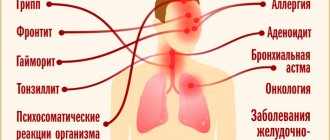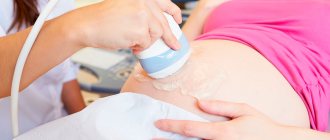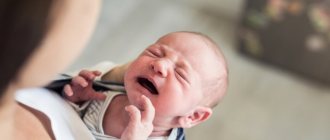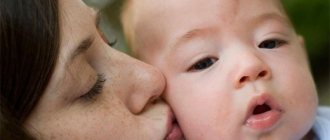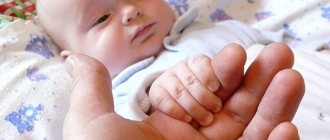Causes of tremor
Tremor in newborns is characterized by general symptoms, but the factors contributing to its occurrence may be different:
- Immaturity of the nervous system. The reasons that provoke trembling of the limbs can be different, but the most common is the immaturity of the nervous system. In this case, as a result of emotional excitement, tremor of the limbs or chin is possible. This option is normal and does not require treatment.
- Hypoxia. Oxygen starvation can be the result of rapid or protracted labor, intrauterine infection, or entanglement in the umbilical cord. Lack of oxygen slows down the child's development, which is why tremors may disappear later than usual.
- Prematurity. Tremors are especially common in children born prematurely. Trembling of the limb and chin in this case may also be the result of immaturity of the nerve centers.
If the factors that result in chin tremor are physiological in nature, the likelihood of negative consequences is minimal.
To exclude possible diseases, it is important for parents of a newborn to consult a doctor if characteristic trembling of the limbs appears. In the presence of pathologies, the consequences of tremor can be irreversible.
Symptoms
Tremor in newborns manifests itself in the form of trembling of the arms, legs, lips, and head. Most often, the pathology manifests itself in half of children at birth. This is considered normal, since tremor may be associated with a fragile nervous system. When trembling of the chin and lips appears, this is allowed and is the norm. Tremor of the limbs most often bothers premature babies.
- There is trembling of the lower lip and chin.
- Leg tremors rarely occur in infants.
- The shaking is asymmetrical and different parts of the body are supported separately. Let's say the chin and upper limb, one leg and arm are trembling.
- It happens that the tremor is symmetrical and mild, but this is within normal limits. Small and rhythmic movements are observed.
Physiological tremor in a newborn can last no more than two seconds. Trembling occurs when a child cries or there is severe nervous overstrain due to bathing.
Tremor can also be observed just like that, suddenly. The first manifestations of tremors occur after one month after birth. Then it will be possible to use various water procedures, they strengthen the nervous system.
If there is tremor in a newborn, then you need to sound the alarm and visit a pediatrician. But, you need to know that up to four months, trembling is physiological and occurs due to a fragile central nervous system. If the trembling remains after five months and becomes more intense, then this may indicate some kind of abnormality. If twitching occurs just like that, and the child has increased excitability, then you need to visit a neurologist.
Diseases and pathologies
In some cases, tremor of the arms, legs, and chin may indicate the presence of a number of diseases and pathologies in the child:
- deficiency in the body of calcium, magnesium or other substances necessary for the body;
- dysfunction of the digestive tract;
- increase in intracranial pressure;
- diseases of infectious etiology;
- tremor of the lips and limbs may be a consequence of damage to the cerebellum.
Tremor is regarded by experts as a pathology that requires treatment if trembling of the limbs is observed after the child is four to five months old.
Consequences of tremor
It is important to know why tremors are dangerous. If the trembling is physiological in nature and completely disappears by four months of the child’s life, negative consequences are unlikely.
Pathological tremor is more dangerous and may indicate brain damage. Lack of treatment in such cases can lead to cerebral palsy or severe motor impairment. There are several signs of pathological tremor:
- trembling covers not only the limbs, but the entire body of the child;
- trembling is observed not only when crying or other form of emotional arousal, but also in sleep, when the child is in a calm state;
- tremor is observed in a child whose age is more than five months;
- trembling of only one limb is observed;
- tremor of the legs or arms is accompanied by a change in skin color and breathing problems.
If any of the alarming signs appear in a child, it is important to immediately show it to a specialist. Timely diagnosis and treatment will help prevent possible consequences.
It is strictly unacceptable to give your child any drugs or supplements that have a sedative or other effect. Uncontrolled use of drugs can aggravate the condition of the baby.
Tremor treatment
Selecting methods for treating tremor in newborns is required only after diagnosis. The choice of drugs is made taking into account the existing disease and the age of the child. In the absence of pathologies, it is recommended to use general methods that will help eliminate trembling of the limbs:
- Regular walks in the fresh air are required at least twice a day.
- It is useful to bathe your child in a bath with warm herbal infusions. A decoction of chamomile, mint, oregano is perfect.
- Every day you need to give your baby a relaxing massage. You can learn the intricacies of its implementation from a pediatrician or a practicing massage therapist.
- Peace and a favorable environment in the family are important. It is necessary to exclude situations that provoke stress in the child.
Compliance with these recommendations improves blood supply to the baby’s organs and tissues, normalizing their condition and stimulating the maturation of the nervous system. It is also important to periodically show the child to a doctor who, if the need arises, will select gentle medications that will help achieve the relaxation effect.
We also recommend reading: pyoderma in children
source
Tremor in children after one year
Tremors may persist in children 2 years of age and older.
This is due to possible deviations associated with pregnancy, or with excitement, fear, strong emotions that strain the nervous system, which is not fully formed. Usually at this age, after an examination, complex treatment is prescribed, including:
- medications;
- physical therapy;
- walks in the air; nutrition.
In some cases, trembling of the lower part of the face and jaw, arms, legs is possible after vaccination. This is due to stimulation of the nervous system and requires consultation with a neurologist.
Tremor in newborns: causes and treatment
Tremor syndrome in newborns is manifested by small twitching of the limbs or chin. Tremor in infants is a common occurrence; it is observed in almost half of newborns. Tremor in a small child can frighten young parents. Minor twitching of the arms, legs, and chin, especially during emotional stress, is a variant of the norm and goes away on its own after some time. However, if you have regular bouts of tremors, you should consult a neurologist.
The doctor will examine the child and give recommendations for the normal development of the baby’s nervous system. Timely contact with a specialist is necessary to exclude pathology and provide the necessary assistance. At the Yusupov Hospital you can get advice from the best neurologists, doctors of medical sciences, well known for their achievements in the treatment of neurological pathologies not only in Russia but also abroad. The clinic accepts patients over 18 years of age.
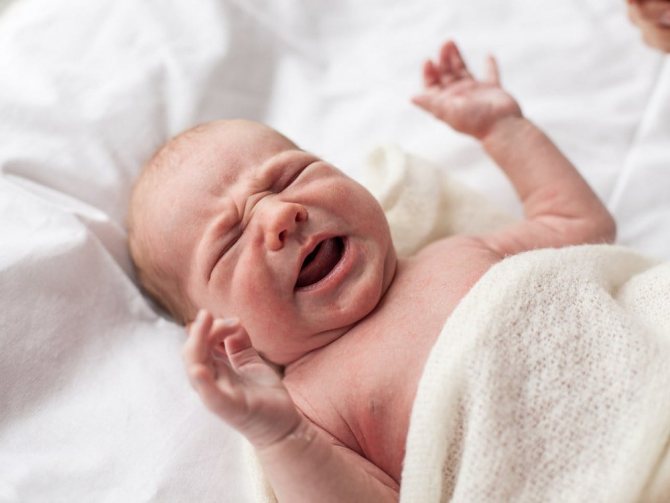
The lower lip of a newborn is shaking: what to do?
Loving parents are very attentive to their baby, they will notice any change in behavior.
And in fact: the facial features of a newborn baby are so perfect by nature that it seems that nothing can disturb this harmony.
However, at some moments you can notice how the lower lip of a newborn shakes, for example, when he cries bitterly. What is this connected with? Let's try to figure it out together.
Possible causes of tremor
First of all, it is worth reassuring the parents of infants: if you notice that a newborn’s lip is trembling barely noticeably, remember that up to the age of three months this phenomenon is considered normal.
With a greater degree of probability, it can be caused by the underdevelopment of a number of systems, such as the endocrine and nervous. They cannot yet function fully, a number of processes fail: for example, with insufficient production of certain hormones, you can observe a similar tremor in the lip area.
The weakness of these two important systems may have different causes:
- Hypertonicity of the muscles of the upper body; Find out what to do in case of hypertension in a newborn>>>
- Premature birth - the newborn will need time to “mature”;
- A pregnancy that occurred against a background of constant stress: the mother’s body “threw out” a lot of adrenaline into the baby’s body, thereby preventing the normal development of the nervous system;
- Complicated pregnancy, difficult childbirth, polyhydramnios, the possibility of miscarriage - all this could provoke fetal hypoxia.
In these cases, you need to wait, because most often lip tremor goes away during the first months of a newborn’s life. Also, provided that if the baby cried for a long time and bitterly, then such a phenomenon should not cause particular concern to parents. Indeed, in some cases, not only the lower lip of a newborn shakes during feeding, but also the chin.
It happens that the child is four months old or more, and the lip is still shaking. In this case, parents should consult a specialist. Read the article, what should a child be able to do at 4 months?>>>
Important! In addition, the newborn should be shown to doctors if the tremor is not caused by any of the known causes, it appears too bright, or not only the lip, but the entire head shakes. Perhaps this is due to any of the pathological processes in the body.
What should parents do?
Of course, when a newborn's lip shakes very noticeably when crying, this should not be a cause for unnecessary concern. But if the situation is related to other reasons, then parents can learn to cope with it together with their child.
- The primary thing that any child needs with any illness is a calm and cozy atmosphere in the family, attention and affection from loved ones. A well-known truth: a calm mother means a happy and healthy baby;
- It has been scientifically proven that classical music and instrumental masterpieces have a beneficial effect on the developing nervous system of a newborn;
- Loud, hysterical sounds, on the contrary, can frighten the baby, so the selection of music should be taken very seriously; there should be no TV in the baby’s bedroom at all;
- A combination of massage procedures and gymnastic exercises is considered an excellent way to correct the unpleasant phenomenon when a newborn’s chin, and not just the lower lip, is shaking. The mother’s touch relaxes the baby’s muscles, this reduces their excessive tension, and gymnastics will strengthen the child’s spine and muscle corset;
- Another method is one of the favorites of both children and adults. To ensure that lip tremor manifests itself as rarely as possible, the child should bathe and swim as much as possible. Read about how to bathe a newborn>>>
Water will perfectly relax tense muscles and help calm the overexcited nerves of a newborn. The main thing is that all movements in the water are calm and smooth, so that the baby does not get scared, but enjoys it.
https://www.youtube.com/watch?v=yKe_mQJDa24
Bathing a newborn can be diversified by using a special circle around the neck. With its help, it will be even more comfortable for the baby to move his arms and legs. The more movements he makes, the better the muscles will work, and their activity helps to cope with trembling in the lip area in a newborn.
Important point! Several times a week, bathing procedures can be carried out with the addition of herbal decoctions that have a calming effect. Read the important article: Herbs for bathing a newborn>>>
Babies tolerate baths best with the addition of decoctions of chamomile, mint, lavender, and lemon balm. It is possible to use a special children's body care series; as a rule, such products contain natural extracts.
Parents should know that maintaining a daily routine is an important factor in the life of a newborn. And in the case of nervous disorders, including tremors of the lip or chin, you must carefully follow the diet and sleep regime, do gymnastics and water procedures on time.
This is a great way to relieve your child of unnecessary stress, because when everything is done systematically, the child gets used to it and relaxes.
The listed methods are most effective for disorders of the nervous and endocrine systems, when a newborn’s lower lip is shaking. They are perfect for young children and will not cause any harm.
Treatment of newborn tremor
There is a clear division among doctors which process is determined by the physiology of the child and which is pathological in nature.
- If the reasons why a child’s lower lip shakes quite violently when crying are related to the peculiarities of the newborn’s development in the initial period of life, then neurologists will never prescribe medications. Parents will only need to carefully monitor the baby, as a result of which it will become clear how dangerous or, conversely, how safe it is.
- If the problem is still associated with some pathology, then drug treatment under the supervision of a specialist cannot be avoided. As a rule, the doctor determines the true source of why the lower lip is shaking in newborns, and then selects the necessary medicine. Gymnastics and massage are important components of the treatment, which are also performed by a qualified treatment specialist.
In both cases, parents should listen to the voice of reason: even if the child’s problems are more serious than it seemed at first, this does not mean that one can succumb to panic or despondency.
In any case, the most important thing for a newborn is that his parents love him and that he is happy and calm at home. The baby should feel the support of his parents and the strength of family ties.
After all, initially there is nothing wrong with the fact that the lower lip of a month-old baby is noticeably shaking, the most important thing is to diagnose the causes of this phenomenon in time, seek medical help if necessary and do the maximum possible so that the baby does not feel that he has any problems. then problems.
Source: https://uroki4mam.ru/tryasetsya-nizhnyaya-guba-u-novorozhdennogo
Causes and consequences
Tremors can be observed quite often in newborns. The reasons for this condition lie in the immaturity of the nervous system of a small child and the lack of full regulation of hormone production. After the baby is born, the nerve centers in the brain that control movement will continue to mature as the baby grows. The child gradually gets used to life outside the mother's womb, and he needs time to adapt.
Another cause of tremor in infants is an excess of norepinephrine. The child's adrenal glands produce too much of the hormone norepinephrine due to the fact that they are also just adapting to functioning outside the mother's womb. The concentration of norepinephrine in a child’s blood increases during times of hunger, cold, fear and other strong emotions. In addition, norepinephrine can be produced in the mother's body and transmitted to the child during fetal development (as a result of which fetal tremors can be observed), or through mother's milk. This is why pregnant and lactating women should avoid stress, remain calm and be in a comfortable environment.
Tremors in a newborn can be noticed during strong crying and hysterics. In this case, tremor acts as a compensatory phenomenon of the peripheral nervous system, which is necessary to stabilize the condition.
However, tremor may indicate not only the processes of maturation of the child, but also the development of pathology. Disorders of the child’s nervous system, which are accompanied by tremors, may appear as a result of:
- premature birth;
- oxygen starvation of the fetus during pregnancy and during childbirth;
- weak labor activity;
- head and neck injuries during childbirth;
- placental abruption;
- umbilical cord entanglement;
- infectious diseases suffered by the mother during pregnancy;
- withdrawal syndrome in the mother during pregnancy caused by alcoholism or drug addiction;
- sepsis, etc.
Tremor in newborns is observed from the first days of life and can persist for up to 3-4 months. Therefore, it is impossible to answer the question of when tremor in infants goes away. Everything is very individual. However, if parents notice head tremors or tremors at rest, they should consult a specialist. These are alarming signs of the development of neurological pathology. It is better to play it safe and check the state of the child’s nervous system. If the doctor discovers any violations, it will be easier to eliminate them at an early age.
What to do
If the tremor in a newborn does not go away over time, and, it must be said, that it can occur later, then one can suspect injury to the child’s nervous system, which could have occurred during pregnancy or during childbirth. There are many reasons for damage to the nervous system - even mild maternal anxiety during pregnancy can negatively affect the nervous system of the developing fetus. This is due to the fact that when a mother experiences anxiety or worries, norepinephrine is released into her blood, which is a provoking factor for tremor in newborns. Lack of oxygen during pregnancy or childbirth can also cause tremors. Oxygen deficiency can develop due to a violation of the integrity of the fetal membrane, hemorrhage, or the threat of miscarriage and infection of the fetus. During the birth process, weakness of contractions, rapid labor, entanglement in the umbilical cord, and separation of the membranes may be observed. All these conditions entail a disruption in the supply of oxygen to the child’s brain, causing oxygen starvation, which manifests itself in the form of tremors in newborns.
Children born prematurely often suffer from tremors of the arms, legs, and chin, since their nervous system is not ready for independent life. And extrauterine development, even with very clean air, is still not the same. In this regard, tremor in newborns, even taking into account its normality, should make the baby’s parents think that the child may have some abnormalities that require control and attention. With timely and competent correction, the nervous system of a small child can easily be normalized and strengthened.
Typically, tremor in newborns does not require correction in healthy children during the first 3 months of the child’s life. But, in any case, if you notice trembling of parts of the baby’s body, you must inform the pediatrician and the visiting nurse about this at the first visit. If necessary, undergo all examinations with a pediatrician and see a neurologist. It’s better to play it safe and make sure that everything is fine with your child than to undergo long-term treatment later.
Also, if the pediatrician said that there is nothing wrong, but the tremor continues for more than 3 months, be persistent, demand a complete and high-quality examination from the pediatrician and consult a neurologist.
If your baby is healthy, but tremors still occur, bathe the child in decoctions of motherwort and mint, this is very calming. Swimming on your arms or with a circle on your neck, a special relaxing massage, and therapeutic exercises, which should be performed by a qualified specialist, will also be useful. But before you do anything, be sure to consult a neurologist. Surround your child in a calm and friendly environment. Correct implementation of all the doctor’s recommendations and your care will definitely bring the child’s nervous system back to normal.
Tremor in newborn babies is manifested mainly by twitching of the chin and upper limbs. It can be considered a similar manifestation of muscle hypertonicity, which is the main sign of an immature nervous system of a baby. Tremor in infants manifests itself mainly due to overexcitability of the nervous system when the baby screams, cries, and also when he wants to eat, or someone frightened him. Parents may also notice that their child's eyeballs move during sleep. This usually occurs during a phase of sleep called REM sleep.
Causes and consequences
Chin tremor in newborns manifests itself in the form of involuntary trembling of the chin caused by muscle hypertonicity. The fact is that the nervous system of newborns has not yet matured, so chin tremor is often a very common phenomenon. Chin tremor in infants occurs with the same frequency as hand tremor. It can appear during crying, provoked by hunger, fear, abdominal pain, cold and any other irritant. It is necessary to calm the child, then the tremor will gradually decrease and disappear completely.
It is impossible to say definitely when a baby’s chin tremor goes away. This will depend on many factors: his physical and psychological development, the presence of congenital and acquired diseases, home environment, and the condition of the mother. If tremors occur when the baby is crying loudly, you should hold him in your arms and press his head to the left side of your chest. This way the child will hear the heartbeat, which is familiar to him during the period of intrauterine development, and calm down. But if tremor manifests itself when the baby is at rest, then parents should seek advice from a neurologist.
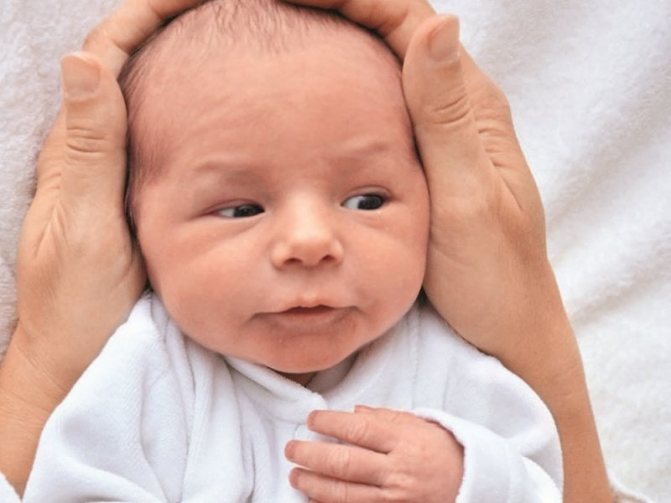
Signs to worry about and call your doctor
If a baby experiences chin tremor after 3-6 months, this may indicate a disorder of the nervous system. Here are some symptoms that may prompt you to see a doctor:
- tremor of the chin in an infant is observed at rest;
- trembling intensifies and lasts longer;
- trembling spreads throughout the head and limbs.
The causes of such disorders may be severe maternal stress during pregnancy, infections, postpartum injuries, hypoxia, rapid or too long labor.
If such symptoms are detected, you should immediately contact a specialist who, after conducting a diagnosis and examination, will be able to accurately determine the cause of chin tremor and prescribe treatment.
The baby's chin and legs are shaking
From the moment children are born, stabilization of the system that is responsible for the production of individual hormones does not occur immediately. An excess of such substances in a child’s body can itself cause slight trembling in the hands. This is quite a common occurrence; after three months such signs will disappear without a trace.
When the baby is more than 90 days old, and his hands continue to shake, this can be considered a reason to consult a doctor, since in such cases, delays can be fraught. It's better to play it safe and find out what the reason is. Under such circumstances, trembling may be a sign of a serious illness or abnormal condition.
Some of the serious causes of tremor include the following:
- Various neurological disorders. Such disorders can very often cause such uncontrolled movements of the baby. In this case, it is imperative to be treated by a neurologist, who will find out why the deviations appeared and determine the necessary therapeutic therapy;
- Hypoxia is when the normal flow of oxygen through the blood to the baby’s brain is disrupted. The main consequence of hypoxia is impaired fetal development, birth injuries and severe labor.
Safe deviations include: hyperglycemia, blood pressure disorders, etc. You should definitely take into account that if the tremor does not stop before the baby reaches the age of three months, you should immediately seek medical help. This is the only way to promptly, if the symptoms are unnatural, identify the disease and prescribe a set of treatment procedures.
Treatment
If chin tremor occurs, you should consult a pediatrician for help, who will issue a referral for examination to a neurologist. In this case, you should not self-medicate, since chin tremor in an infant may be a symptom of a serious illness.
The Yusupov Hospital has neurology and rehabilitation clinics, where treatment is provided by leading Russian specialists. After an examination and the necessary diagnostics, the doctor will be able to identify the causes of chin tremor and prescribe the necessary treatment. In non-critical situations this could be:
- relaxing herbal baths at home. It is often recommended to add herbs such as lemon balm, chamomile, oregano;
- Therapeutic massage helps relieve muscle hypertonicity and tension. A massage course, which must be performed by a specialist, usually includes 10 sessions. The course should be repeated after 1-2 months;
- special gymnastics is carried out by a specialist; in the future, the baby’s mother can perform such gymnastics independently at home;
- Swimming in the pool has a very beneficial effect on the baby’s muscle tone and nervous system.
If the nervous system disorders are more serious, then drug treatment may be prescribed. Medicines will speed up the maturation of the nervous system and thereby eliminate the cause of tremor.
At the Yusupov Hospital, highly qualified doctors treat a wide range of neurological diseases and provide rehabilitation using the latest evidence-based techniques. Doctors at the Yusupov Hospital regularly undergo advanced training and master new treatment and rehabilitation techniques.
Experienced rehabilitation therapists are proficient in the latest techniques of therapeutic massage and exercise therapy, which allows them to achieve the maximum effect in treatment. The neurology clinic accepts patients even in the most severe condition, who were rejected by other hospitals. You can make an appointment with a doctor by calling the Yusupov Hospital.
Treatment methods
The choice of treatment method is influenced by the reason that gave rise to the symptom. When it is a direct consequence of pathology, the pediatrician and neurologist establish the disease.
Doctors, taking into account the child’s condition and the severity of the process, select a drug, prescribe a course of therapy and, if necessary, make adjustments to the treatment. They supplement the medicinal effect with therapeutic massage and gymnastics.
When involuntary muscle contractions occur due to physiological reasons, neurologists do not prescribe medications. Parents are advised to take time to observe the child and monitor the dynamics of his development.
In the second case, the lower lip of a newborn shakes due to muscle hypertonicity; to reduce it, neurologists recommend:
- Once a week, take a bath in water with the addition of a decoction of lemon balm, mint, chamomile, and string;
- Organize water treatments daily to calm the nervous system and relax muscles with warm baths;
- conduct massage sessions and gymnastics.
Gymnastics for newborns in water
Gymnastic exercises consist of smoothly crossing and spreading the arms, “bicycle”, bending the legs towards the stomach, raising and lowering the arms, bending the child’s arms towards the shoulder joints.
Pediatricians advise starting massage when the newborn reaches 6 weeks of age. The effectiveness of the procedure increases when it is performed before swimming. Stroking, rubbing, kneading, vibration are the main massage techniques that need to be performed from the periphery to the center.
Basic movements include:
- stroking the face, starting with the eyebrows and cheeks;
- gentle stroking of arms and legs;
- gently kneading your fingers;
- smooth stroking of the chest and back in a herringbone pattern;
- massaging the legs in the direction from the feet to the thigh;
- stroking the abdomen in a circular motion with the entire palm in a clockwise direction.
Massage sessions should be carried out while the child is awake, carefully monitoring his mood. If he begins to show dissatisfaction, you should stop the session and return to the lesson later.
Consultation at Yusupov Hospital
You can get advice on the causes of tremor in a child from neurologists at the Yusupov Hospital. Experienced doctors, doctors and candidates of medical sciences work here, who perform high-quality diagnostics and treatment of various neurological diseases.
At the appointment, the doctor will perform a neurological examination, evaluate reflexes, and analyze development. If necessary, additional examination methods will be prescribed, which can be completed in the modern diagnostic center of the Yusupov Hospital. After the examination, the doctor will give recommendations for further action.
If the tremor in a newborn is not pathological, then it will be enough to give the child a massage, engage in physical therapy, swimming, take baths with soothing herbs, and breathe fresh air. Additionally, medications that improve oxygen supply to tissues may be prescribed.
In the case of a pathological nature of the tremor, appropriate treatment will be prescribed, which will include more serious measures: drug therapy, physical therapy. Treatment is prescribed strictly on an individual basis, depending on the condition of the little patient.
You can make an appointment with neurologists or undergo an examination at the diagnostic center by calling the Yusupov Hospital. The clinic accepts adult patients.
source
When to see a doctor
When a child's lower lip shakes from excitement when receiving a toy, when frightened or crying, at the stage of REM sleep, but the intensity of the symptom gradually weakens, then this can be attributed to normal reactions in a newborn to internal and external stimuli.
In situations where the trembling has not stopped 6 months after birth, the child shows anxiety and tearfulness, sleeps poorly, and should be closely monitored.
It is necessary to contact your pediatrician so that he can give a referral to a pediatric neurologist if lip tremors:
- repeats every day;
- lasts more than 30 seconds;
- arises without cause;
- becomes more intense;
- accompanied by convulsive contractions of the muscles of the chin, face, and limbs;
- begins at the end of feeding;
- appears accompanied by trembling and perspiration.
If the clinical picture is accompanied by diarrhea, colic and poor sleep, you should take a referral to see an endocrinologist.
Tremor in a newborn
Tremor in a newborn is a disorder that occurs from the first days in infants. It manifests itself in the form of systematic oscillatory muscle contractions. Shaking of the limbs and trembling of the chin are more common; head tremor occurs less frequently, which can signal severe pathologies of a neurological nature. During the three-month period from the moment of birth, tremor in a newborn child does not require therapeutic or corrective action. Increased muscle tone accompanying trembling indicates insufficient formation of nerve structures.
Tremor in a newborn is a fairly common phenomenon. As a rule, uncontrolled muscle contraction occurs more often due to strong arousal or during babies' dreams (REM sleep phase).
The baby's chin shakes when he cries
Even taking into account the fact that a born baby is fully capable of “independently” existing (he can perform certain natural actions: drink milk, breathe, defecate, etc.), all of his biological systems and functioning organs are not fully formed and continue to improve for quite a long time. time period from the moment of birth. For this reason, a small child develops many conditions that would be considered clear signs of a health disorder in an adult. But for a child, this can only mean that he continues to develop normally.
These conditions can be called transient, i.e. they can go away on their own, without the use of special therapy. Physiologically they are completely normal and do not require medical intervention. Such natural conditions include: diarrhea, constipation, jaundice, weight loss, rash, fever and much more. This also includes the tremor observed in infants, which is characteristic of many babies. It is characterized by trembling (twitching) of individual muscles of the child. If a baby's leg, arm, chin or lower lip begins to shake, then this is a tremor.
This phenomenon at the physiological level is explained by the fact that the baby’s endocrine and nervous systems are not fully formed:
- the nerve centers in the baby’s brain are not yet properly able to coordinate some movements, performing functions at the usual level, for this reason the baby has quite sensitive manifestations to many stimuli;
- The adrenal glands produce excess amounts of the “stress hormone,” also called norepinephrine. When a baby experiences any emotional state, such signs may stand out more than necessary.
This means that the baby, experiencing even the slightest amount of physical or emotional stress, shudders, or some parts of his small body begin to tremble, for example, lips, legs, arms, and even a combination. A similar tremor appears when the baby is excited, when something frightens him, if he laughs, or, conversely, cries, while feeding, raising his hand, etc.
In this case, anything can act as irritation factors. This can occur from loud sounds, sudden movements, bright light, feelings of thirst or hunger, the feeling of an unpleasant odor, during joy, with colic and other painful sensations, during any actions that lead to stimulation of the baby’s nervous system. Sometimes the baby’s chin begins to tremble even in a calm state.
Children born before 9 months are especially susceptible to such symptoms, since their biological systems are even weaker than those of babies born on time. But even then, this does not mean that any special treatment is required. It is quite possible that in such a baby all body systems will return to normal and be properly formed a little later than this should usually happen.
According to experts, upon reaching a year, such manifestations will disappear, gradually fading away. Twitching is most noticeable in the first period of a baby’s life – from three to four months.
Causes of tremor in a newborn
Often the main reason that causes chin trembling and limb tremor in newborns is dysfunction of the endocrine glands and incorrect functioning of the nervous system. Such disorders often arise due to pathologies of intrauterine fetal formation.
Also, the causes of tremor in a newborn can be immaturity of the nervous system, oxygen starvation of the fetus during the process of intrauterine formation, and premature birth.
In the first weeks of the baby's birth, he may lack coordination of movements due to the immaturity of the nervous system, which will cause tremors in the newborn. Increased muscle tone is also a risk factor for tremor in a newborn. In addition, during emotional manifestations, babies may experience high levels of norepinephrine in their blood. Fetal hypoxia occurs due to disturbances in placental blood flow during pregnancy or during the birth process. It can also be triggered by intrauterine infection, dysfunction of the placenta, hemorrhage, increased uterine tone, and polyhydramnios. Oxygen deprivation can negatively affect the functioning of the brain.
Baby's chin shakes while feeding
The body systems of an infant (in particular the endocrine and nervous) are not sufficiently formed. Whenever a person experiences any emotion, the hormone norepinephrine is released into the blood. It happens that children secrete it in significant quantities. This leads to the fact that, influencing the incompletely formed nervous system, the hormone causes trembling in the baby.
It is considered normal for a small baby to react when, during rapid sleep, crying, fear, or other emotional experience, his lower jaw trembles. These natural twitches are observed for up to three to four months. Sometimes a tremor on the chin can be observed while feeding the baby, which is not a reason to fear something serious, of course, if the baby is eating quite normally and there are no other symptoms of NS diseases.
However, sometimes chin tremor in an infant occurs when the nervous system is disturbed and the brain is hypoxic. The reasons for this lack of oxygen can lie in many ways, mostly due to the presence of anemia during pregnancy, birth trauma, or infection in the child’s body in the womb.
It is necessary to visit a doctor for consultation when:
- the lower part of the child’s jaw trembles, even when he is calm and not emotionally active;
- tremor affects not only the lower jaw, but also the head as a whole;
- the child is more than three months old, but the tremor does not stop;
Of course, each baby develops differently, but there is no need to panic if there is tremor of the lower jaw. A visit to the pediatrician will not be unnecessary.
Chin tremor in a newborn
Tremor of the lips in newborns or trembling of the chin when crying or screaming in babies under three months of age is considered normal.
The causes of this condition in infants can often be due to insufficient development of their nervous and endocrine systems. At this age stage, the neurons responsible for movement are underdeveloped. In addition, the adrenal glands that produce the hormone norepinephrine are also immature in newborns. Both described factors, when combined, lead to tremor in a newborn.
Below are the main causes of chin tremor in a newborn.
Most often in infants, chin tremor is observed due to excessive physical stress or due to emotional overload, which indicates overexcitation of the nervous system. However, if chin tremor is observed in newborns in the absence of physical strain or crying, then this should definitely attract the attention of adults. Involuntary oscillatory muscle contractions may be a sign of increased muscle tone.
In most cases, a systematic relaxing massage is recommended to get rid of involuntary contractions of the chin muscles. In addition, regular warm baths with decoctions of valerian, mint or lemon balm are recommended. These plants have a relaxing and calming effect. However, you should not overuse them, as allergic rashes may appear. It will be enough to carry out balneological procedures at least three times every ten days.
If the symptoms of tremor in a newborn have not disappeared after three months, then it is necessary to consult a pediatric neurologist. Continuous trembling is often a sign of serious pathologies of the nervous system.
Balneotherapy, relaxing massage, early swimming - all of these activities help strengthen the children's nervous system, thereby eliminating the phenomenon of chin tremor.
The baby's chin is trembling: why?
When a baby is born, it undergoes a kind of stress, because the familiar warm and calm environment of the mother’s womb has been replaced by a large open space that needs to get used to. In addition, newborn babies do not have strong immunity; each system in their small and fragile body has not yet formed and become stronger; moreover, children need some time to adapt to external conditions.
This addiction is accompanied by certain side effects, including trembling of the chin. This phenomenon occurs for the reason that the baby is not yet able to fully control muscle functions, as adults successfully do; their nervous system is immature.
Of course, the baby is constantly developing, and every such “strangeness” leaves no trace.
It must be remembered that trembling of the chin in a child up to three months of age is normal, so there is no reason to worry, much less panic.
Physiology of tremor
Thus, newborns undergo a process of muscle strengthening, that is, in most cases this is a normal physiological process. However, chin trembling can also occur under the influence of another factor - insufficient formation of the endocrine system.
This system is responsible for creating hormonal balance in the body. It keeps under control every release of a particular hormone by certain glands located throughout the body. When your chin begins to tremble, this is due to the excess content of norepinephrine in the blood, the production of which is responsible for the adrenal gland. A similar hormone is released into the blood when the baby is overly excited.
Simply put, when he:
- makes active movements;
- shows loud joy;
- screams;
- crying.
You need to understand that this is quite normal for a child, and there is no need to worry about it.
Under what circumstances is caution warranted?
There are circumstances in which the appearance of a shaky chin in a baby is a signal to parents to sound the alarm. In this case, you should immediately contact a pediatrician or neurologist.
What are these circumstances?
- The child continues to experience chin tremor even after three months;
- Excessive shaking appears;
- The chin trembles regardless of the condition of the baby.
Why should you be concerned? The thing is that each of these symptoms indicates disturbances in the normal functioning of the body systems (endocrine or nervous). This may be a pathology, and here time plays an important role.
Each of the disorders in a child’s body can be stopped, unless, of course, the disease has had time to develop irrevocably. Therefore, in such cases there is no need to wait, consulting with relatives and friends.
Sometimes the reason for such symptoms may lie in an unsuccessful birth process.
Eg:
- polyhydramnios;
- brain hypoxia;
- rapid or sluggish labor;
- umbilical cord entanglement;
- placental disorders.
However, such a number of reasons still does not indicate significant harm to the child; in such cases, the tremor will go away in the future. It is much worse if the problem is neurological in nature. This kind of pathology is difficult to cure, because it is not some kind of common cold.
You can find out what to do if your child constantly cries and does not sleep in our article. Read about the daily routine of a three-month-old baby here.
What to do if the baby does not get enough breast milk, read the link
Prevention
If the baby is not even one month old, let alone three, and sometimes his chin trembles, there is no need to create panic. However, there is no need to forget about such a problem, because the continuation of symptoms is a signal of active action.
There is a separate set of preventive measures that can reduce or even completely rid the baby of such an unpleasant and alarming symptom.
The following procedures can be performed for the child:
- bathe him using a collection of medicinal herbs;
- practice chin massage.
These two actions can be successfully combined. You need to know that in some cases, baths with herbs can cause an allergic reaction in a child. That is, first you need to make sure that the herbs are safe for the baby. The face should be massaged onto the child's chin with gentle movements so that he feels joy.
Leg tremors in a newborn
Often in infants you can notice a slight trembling of the chin and twitching of the limbs. Such oscillatory muscle contractions in newborns are observed in almost fifty percent of cases during the first month of life. They occur when babies cry excessively, are frightened, or during the REM sleep phase due to excessive emotional arousal. The nervous system of infants is characterized by immaturity, which leads to excessive excitability, giving rise to some uncontrolled movements.
Leg tremors in a newborn may appear due to an increase in the level of norepinephrine in the blood, the excess of which gives rise to the same excessive emotional manifestations, again due to the immaturity of the adrenal medulla that produces this hormone.
In addition, there are critical stages in the formation of the nervous system of infants, during which the nervous structures are most vulnerable to the occurrence of disturbances or failures in its normal maturation. Such dangerous periods include the first month of a baby’s life, the third, ninth, and twelfth. It is at these stages that it is advisable to visit a pediatric neurologist.
If attacks of tremor in a newborn are observed after the baby is one year old, this may mean that either damage to the nervous structures is present at the moment, or it occurred at the stage of intrauterine maturation of the fetus or during its passage through the birth canal.
Twitching of the upper limbs and tremor of the chin in infants, often observed during their crying, is caused by a balancing excitation of the nervous structures, which helps stabilize the body's condition. Trembling, usually arising against the background of stress, is characterized by small amplitude and is observed at fairly short time intervals. Leg tremors are also often a side effect of increased muscle tone.
Thus, involuntary small twitching of the lower extremities in infants up to three months of age is a normal variant. Contraction of the leg muscles in infants is considered a harmless, passing manifestation of the immaturity of the body.
Twitching is often observed during the baby's dreams (REM sleep phase). Such tremors look like this: the baby’s limbs tremble intensely, the eyes move under half-closed eyelids. Such attacks of tremor in a newborn gradually disappear a week after birth, appearing only during severe fright of the baby or during a hysterical cry. If the upper limbs of children continue to tremble even in a state of relaxation, then consultation with a specialist is necessary.
Twitching of the lower extremities in newborns occurs much less frequently than tremors of the upper extremities or tremor of the chin. More often, leg tremor occurs in premature babies, as well as in children who have suffered birth trauma or brain hypoxia.
In the event of uncontrolled muscle contractions, therapeutic massage, swimming, and gymnastics will perfectly cope with them. In other words, any procedures aimed at strengthening the muscular system of the legs and nervous system help with tremors in a newborn. However, if there is severe trembling, which does not stop even at rest and has not gone away after three months, then there is no need to engage in “self-medication”, since only a qualified specialist can help in this case.
In addition, hand tremors in newborns and twitching of the lower extremities are dangerous because parents may confuse them with seizures caused by serious pathologies that require immediate medical intervention. In rare cases, uncontrolled muscle contractions can be caused by abnormal structure of certain parts of the lower limb or injury. Often, the symptoms accompanying twitching of the muscles of the lower extremities can indicate the presence of a more serious illness. That is why a doctor must diagnose the pathology and prescribe therapy.
Non-pathological tremor is also called benign or physiological tremor. As the name suggests, the factors that provoke muscle twitching are in this case hidden in the physiological processes of the body, and not in pathologies. Benign tremor includes trembling caused by hypothermia, tremors of the limbs after physical overload or strong emotional outbursts.
If parents first notice involuntary oscillatory contractions of the muscles of the lower extremities in their newborn child, it is first recommended not to take any action until consulting a neurologist, since inept massage can only worsen the baby’s condition. Also, you should not cancel medical prescriptions on your own, believing that the medications are useless. After all, pharmacopoeial drugs are prescribed for serious disorders, and are most often aimed at optimizing the access of oxygen to the cellular structures of the body. Such medications include Mydocalm, Glycine, etc.
Why does a newborn’s lower lip shake: the reason, what to do
The birth of a baby is always a joy for young parents.
Naturally, all the attention of the mother and father is focused on the child. They can't get enough of how well he eats, sleeps and smiles back at them. But when the baby starts crying and the parents notice their lips trembling, they become alarmed. Therefore, we will look at why a newborn’s lower lip is shaking.
Causes of lower lip tremor in babies
Often mothers notice that their child’s lower lip shakes when the baby is at rest. And here the parents begin to panic. The thought immediately pops into their head that their little one is seriously ill with something.
In babies under 3 months, the appearance of tremor of the lower lip is considered normal.
Tremor is a shaking associated with involuntary contraction of the mental, triangular and quadratus muscles of the lower lip. Now let's look at the reasons for the formation of tremors from the norm and pathology.
Physiological tremor:
- Response to stimuli (cold, stress, loud sound, sudden influx of bright light).
- When a newborn is stressed, an uncontrolled amount of norepinephrine is released from the adrenal cortex, which enters the bloodstream. NA causes vasospasm and contraction of smooth muscle tissue.
- An underdeveloped central nervous system is unable to regulate the baby's movements.
Among the stressful situations why a newborn's lower lip shakes, one can highlight: bathing, intestinal colic (pain), the moment of changing clothes, a state of hunger, and ordinary fatigue.
Pathological tremor:
- Involuntary muscle contraction at rest.
- Joint trembling of the chin and lower lip, limbs, head.
- Frequently recurring tremors.
- After three months of age, trembling becomes more frequent.
The causes of pathological tremor are:
- prematurity (in premature children, trembling is observed up to 1.5-2 years);
- stress during pregnancy;
- developmental disorder of the peripheral nervous system (PNS);
- increased ICP (intracranial pressure);
- increased blood sugar in a newborn;
- maternal diabetes mellitus or impaired glucose tolerance during pregnancy;
- birth trauma (long, protracted labor; injury received when the head passes through the birth canal);
- Polyhydramnios, infections during pregnancy and a deficiency of essential microelements and vitamins (in particular Mg and B vitamins) can cause disruption in the development of the central nervous system (hereinafter referred to as the CNS) of the fetus.
Oxygen deficiency caused by umbilical cord entanglement, prolonged labor, placental abruption, or prolonged pregnancy may be the reason why a newborn’s lower lip is shaking.
